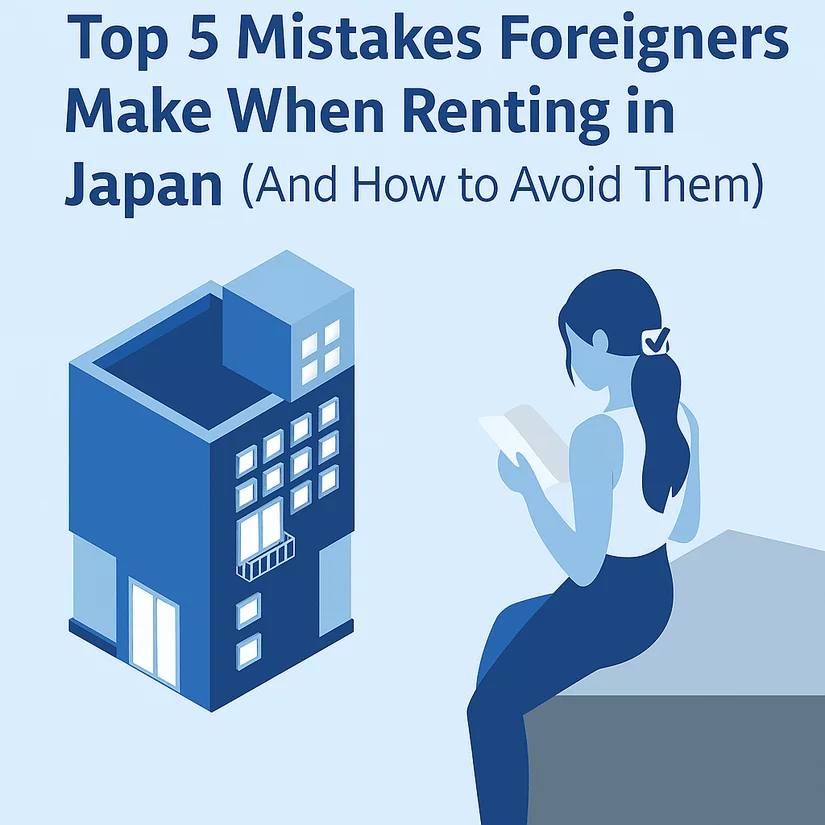Top 5 Mistakes Foreigners Make When Renting in Japan (And How to Avoid Them)

Renting an apartment in Japan as a foreigner can be challenging. With different cultural expectations, a unique rental system, and language barriers, it’s easy to fall into common traps. This guide will walk you through the five most frequent mistakes foreigners make when renting in Japan — and how you can avoid them.
1. Not Understanding Key Rental Terms
Japanese rental contracts include terms that may be unfamiliar. Misunderstanding them can lead to unexpected costs or confusion when signing a lease.
- Reikin (Key Money): A non-refundable gift to the landlord (often 1–2 months’ rent).
- Shikikin (Deposit): Usually 1–2 months’ rent, refundable minus cleaning/repairs.
- Chukai Tesuryo (Agency Fee): Typically one month’s rent.
- Koshinryo (Renewal Fee): Charged when renewing a 2-year lease (often one month’s rent).
How to avoid it: Always ask for a detailed fee breakdown before signing anything. A good agent should provide this up front.
| Standard Agency | Foreigner-Friendly Agency |
|---|---|
| Japanese-only support | English, French, or multilingual support |
| May reject foreign applicants | Experience handling visa/residence requirements |
| Little guidance on documents or process | Step-by-step help with hanko, phone number, forms |
| Not transparent with fees | Upfront, clear fee breakdown |
| No help post-contract | Often provides after-support for utilities, internet, etc. |
2. Underestimating Upfront Costs
It’s common to think "I can afford ¥80,000/month rent," only to be shocked when the move-in total is over ¥300,000.
Here’s a typical breakdown:
- First month’s rent: ¥80,000
- Deposit (Shikikin): ¥80,000
- Key Money (Reikin): ¥80,000
- Agency Fee: ¥80,000
- Guarantor Fee & Insurance: ¥20,000–¥30,000
How to avoid it: Ask your agent for a full shikikin/reikin meisaisho (itemized estimate). If it's unclear, be cautious.
3. Choosing a Place Too Close to the Station
Being 2–3 minutes from the station is appealing, but rent increases sharply the closer you are to a major train line.
Example: A 1LDK 3 mins from Umeda Station might cost ¥120,000, while a similar one 15 minutes away by bike could cost ¥85,000.
How to avoid it: If you're comfortable walking a bit more or biking to the station, you can find much more affordable and spacious apartments. In many Japanese cities, neighborhoods just 10–15 minutes farther out offer quieter streets, better light, and up to 30% cheaper rent.
4. Not Having a Guarantor (or Using the Wrong One)
Most Japanese landlords require a guarantor (someone who agrees to pay if you can't). Without one, your application may be rejected.
These days, guarantor companies are more common and accepted by most agencies and landlords.
How to avoid it: Use a guarantor company if you don’t have a qualified friend or employer. Fees range from 30–100% of a month’s rent per year.
5. Skipping a Foreigner-Friendly Real Estate Agent
Many real estate agents in Japan do not speak English or may be hesitant to work with foreigners due to perceived complications with paperwork and communication. This often leads to miscommunications, rejected applications, or missed opportunities.
How to avoid it: Work with an experienced, foreigner-friendly agency. These agents understand that foreign clients may need help with things that are obvious to locals — like obtaining a Japanese phone number, using a personal seal (hanko), or navigating document translations. Some agents may even offer to assist with these steps.
Pro Tip: Look for agencies that offer multilingual support and clearly advertise experience working with non-Japanese tenants. This ensures a smoother and more transparent rental process. In terms of pricing, foreigner-friendly agencies are not necessarily more expensive — and in some cases, they may help you find better deals or avoid unnecessary fees thanks to their experience and transparency.
Bonus Tips for a Smooth Move-in
- Set up utilities early: Especially gas, which requires an appointment.
- Take photos on move-in day: Document any damage to protect your deposit.
- Visit the apartment at different times of day: Japan’s dense urban environment means sunlight can be blocked by nearby buildings, even in south-facing units. What seems bright at noon may be dark by 4 p.m.
Final Thoughts
Renting in Japan doesn't have to be stressful. By avoiding these common mistakes — and working with a supportive agent — the process becomes much smoother. Whether you’re moving to Tokyo, Osaka, or a smaller city, being prepared and well-informed is the best way to find a great home.
Looking for help renting in Japan?
Contact Maido Real Estate — English, French & Japanese support for expats and newcomers.
